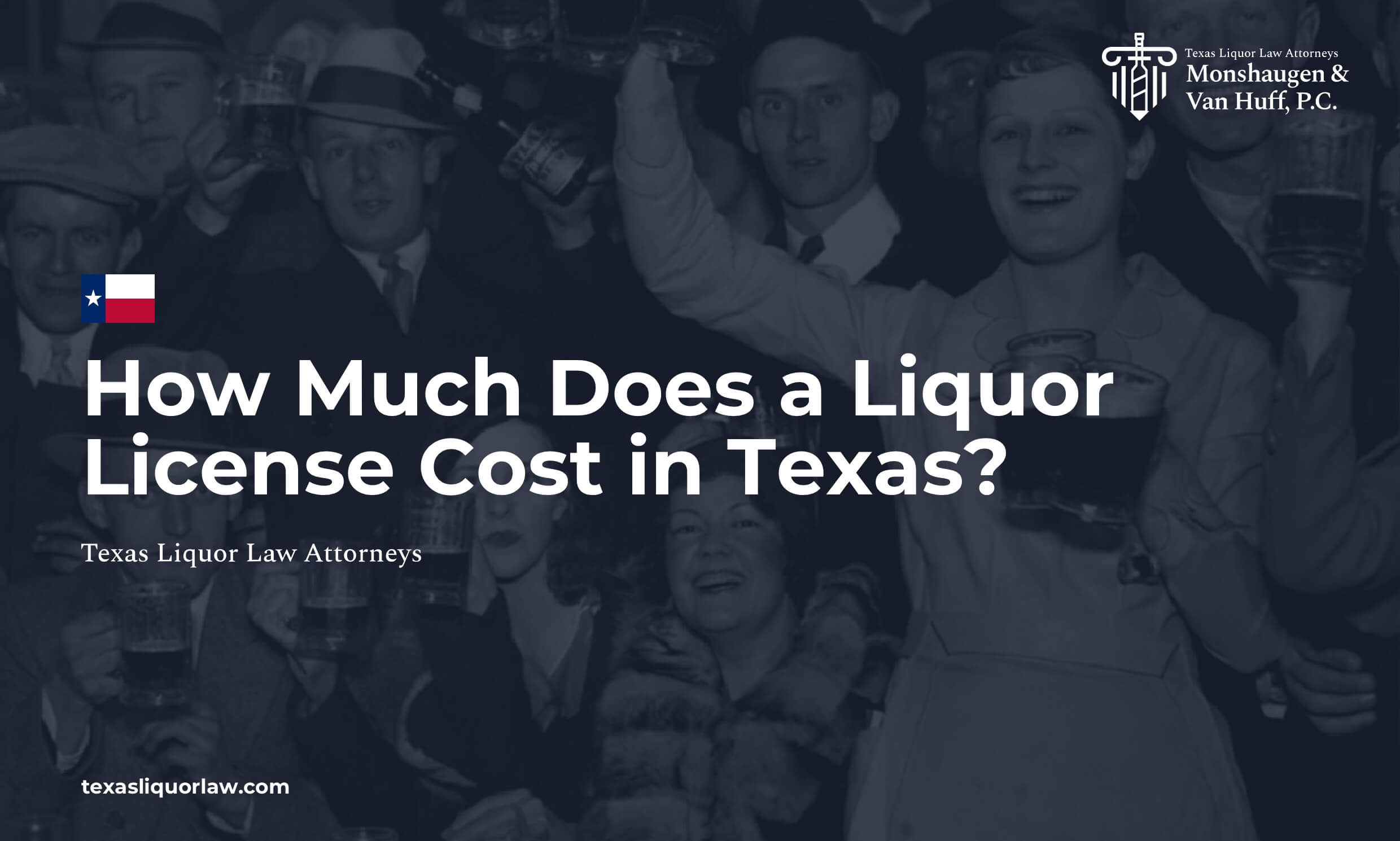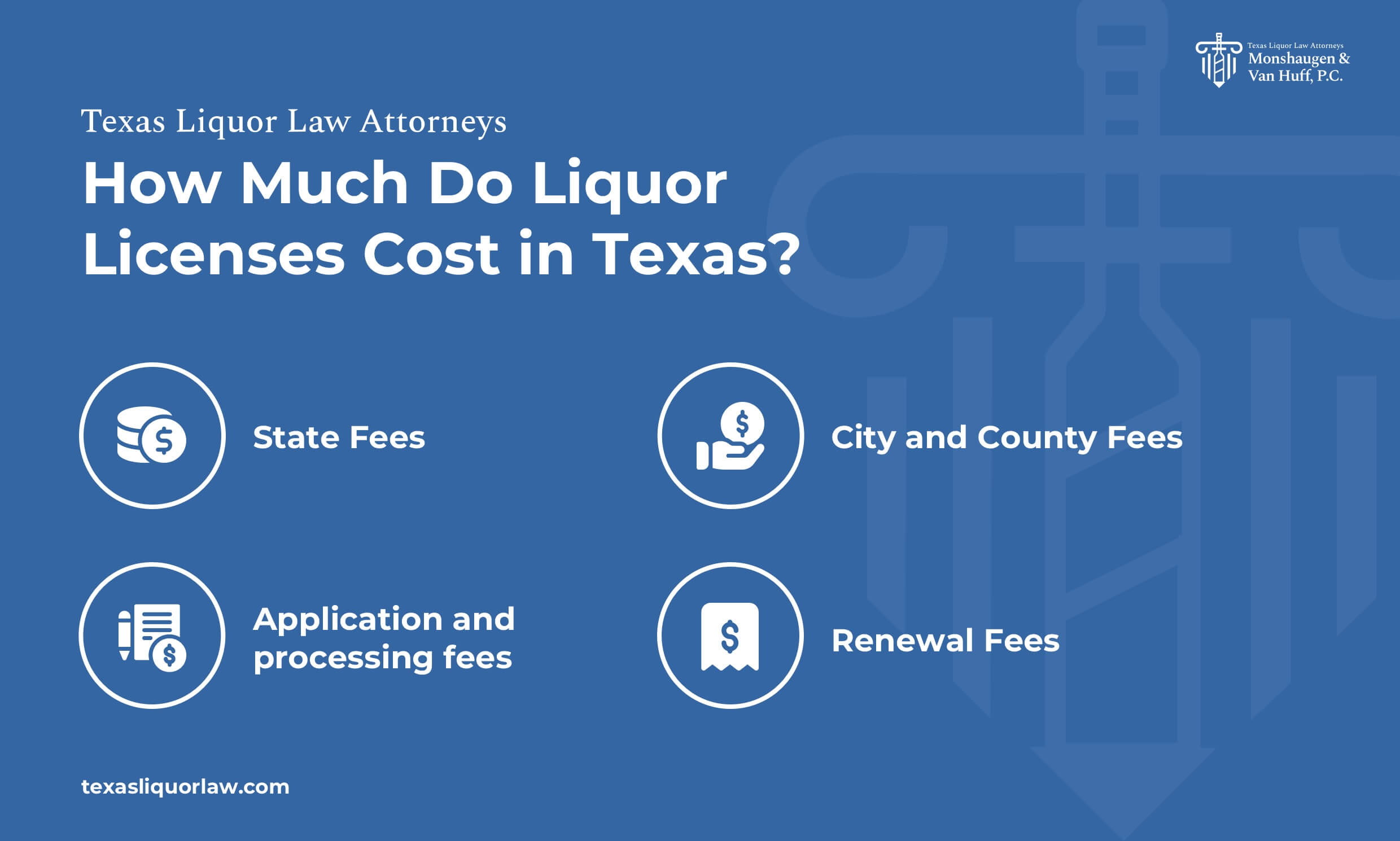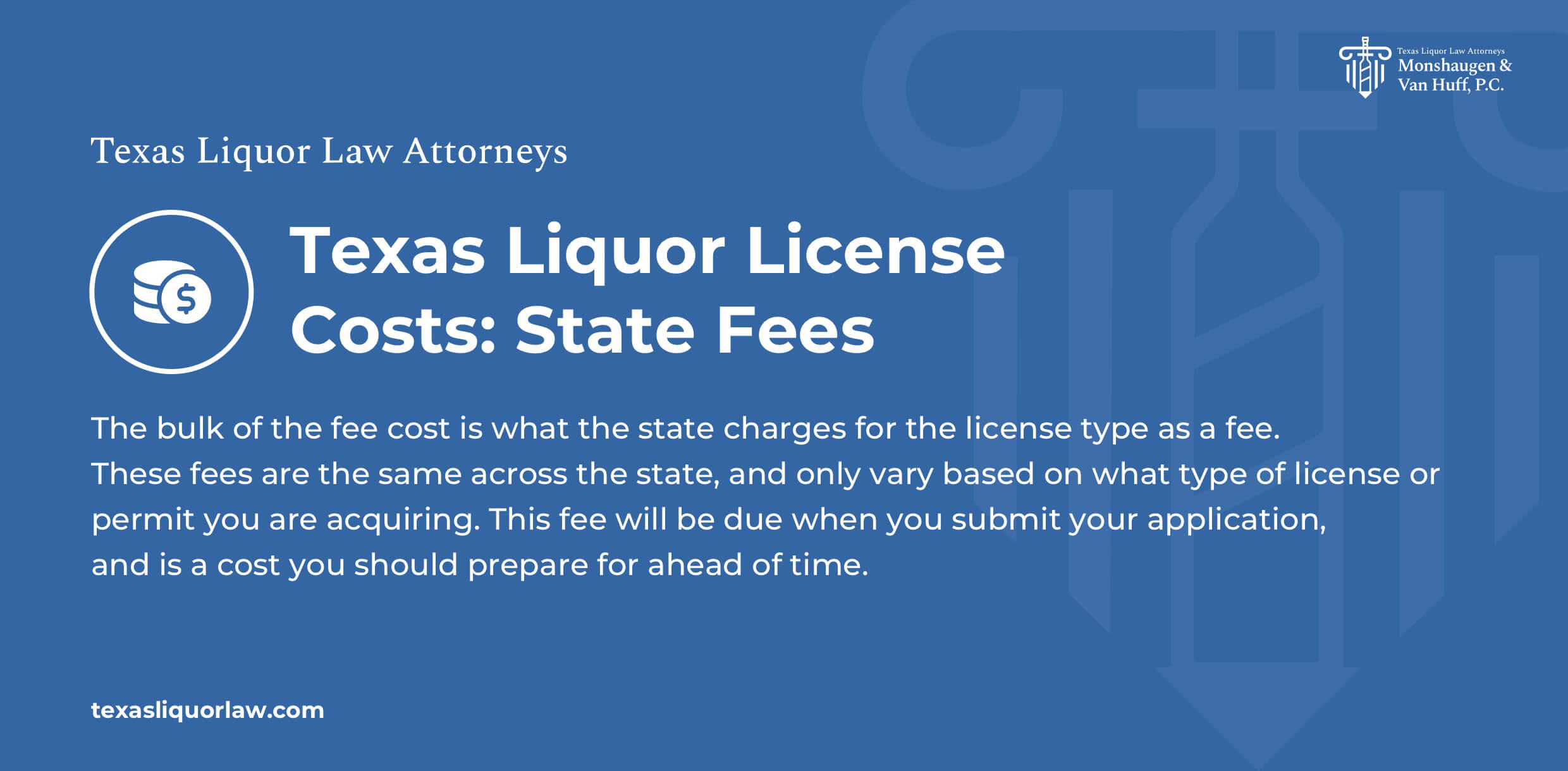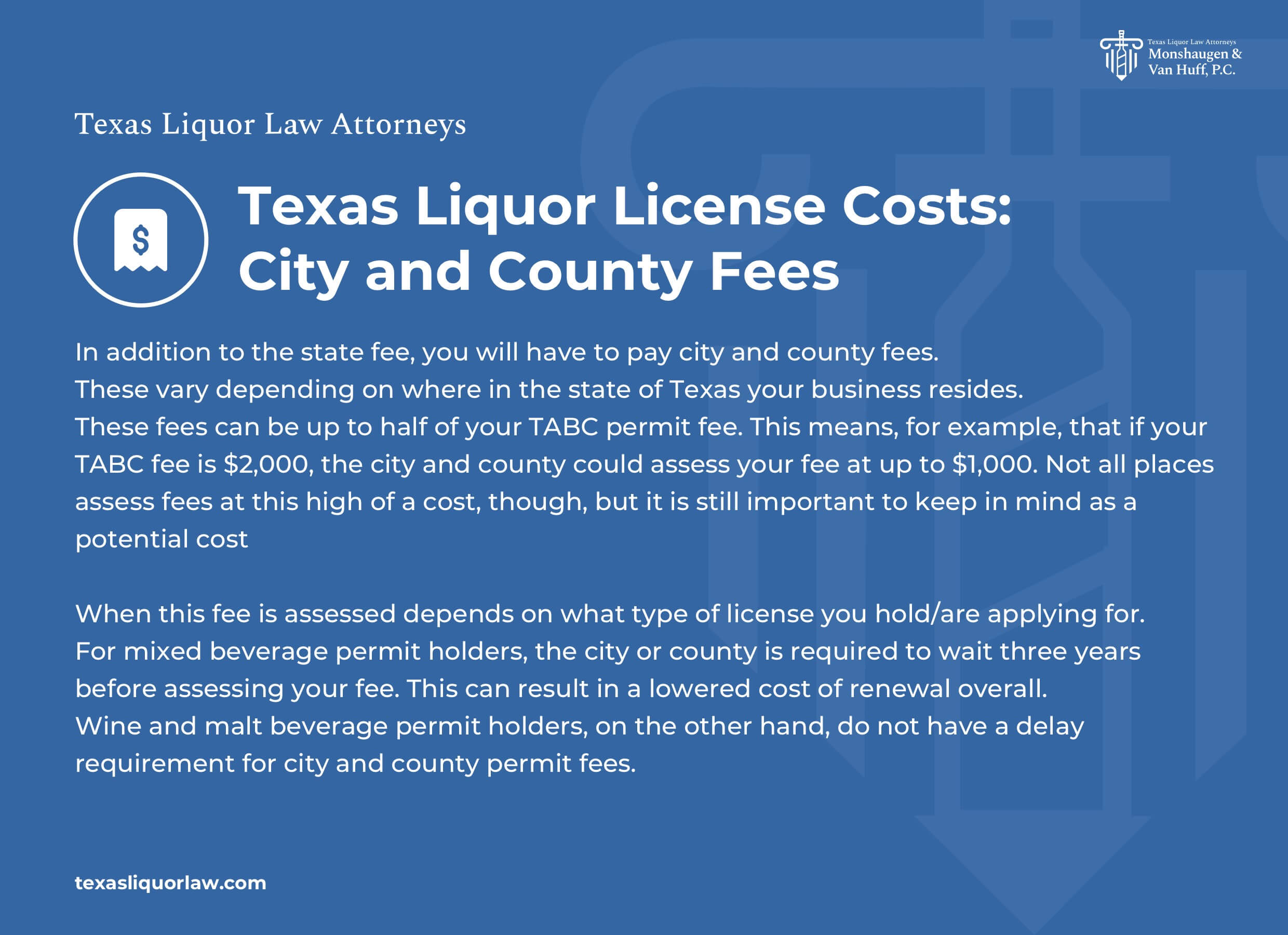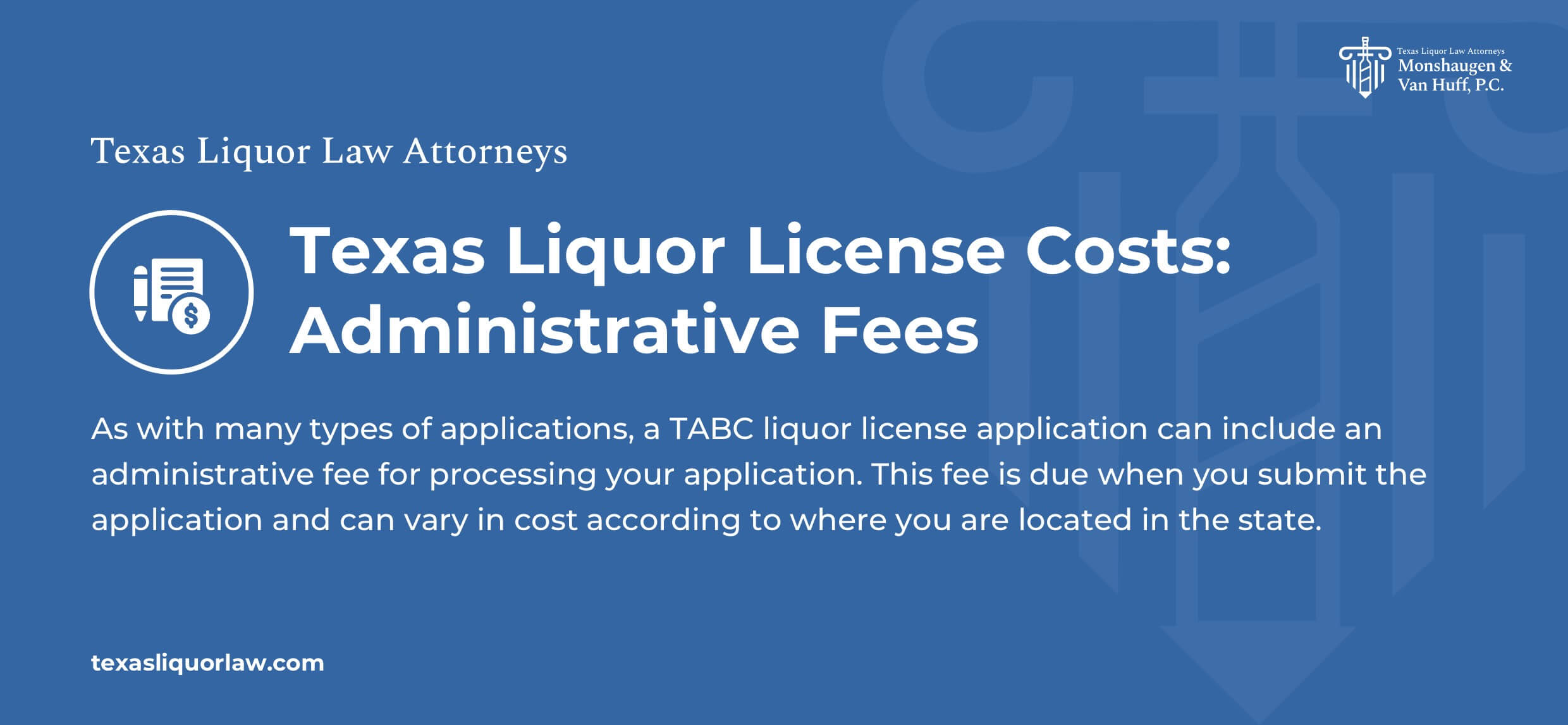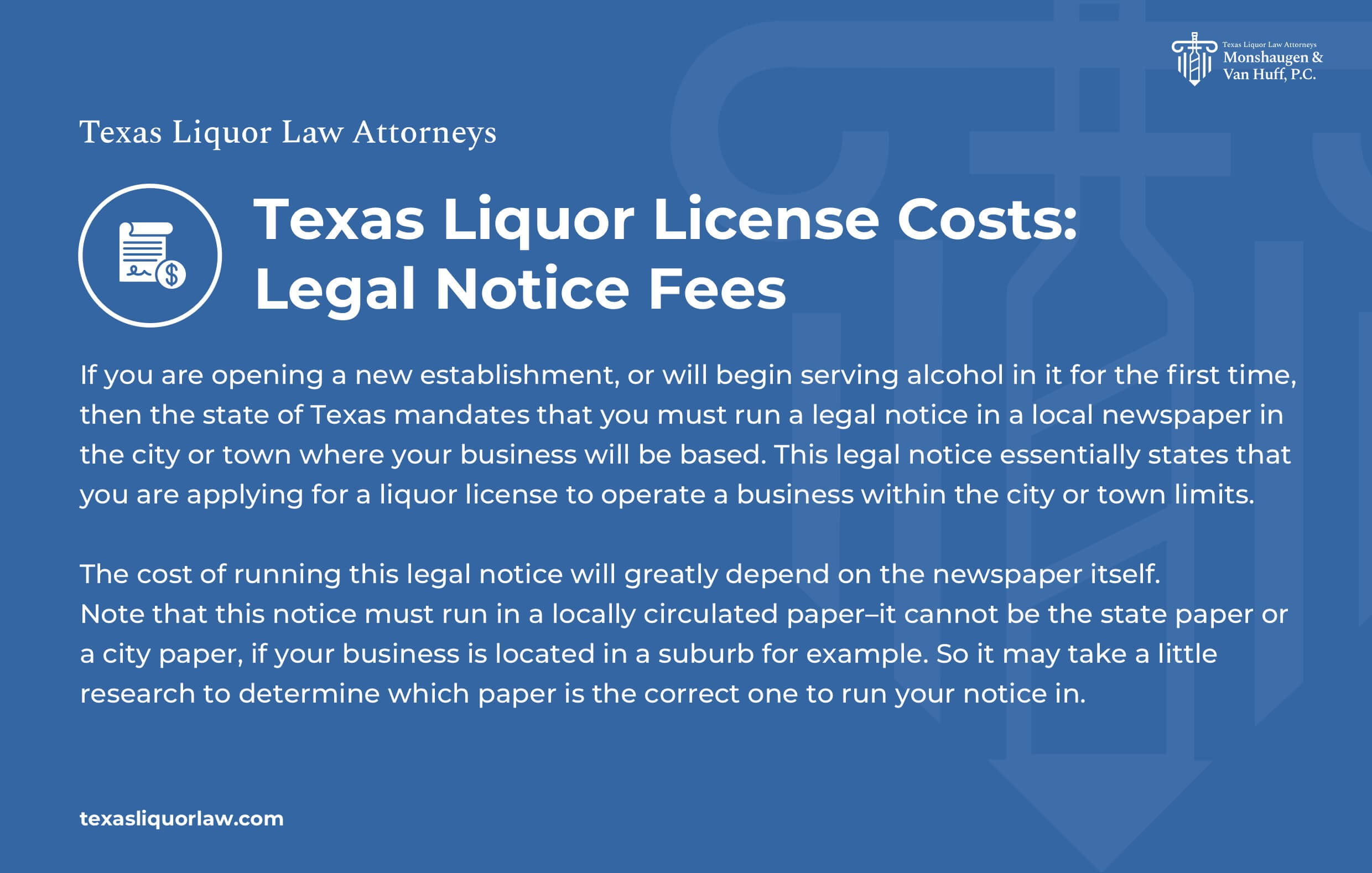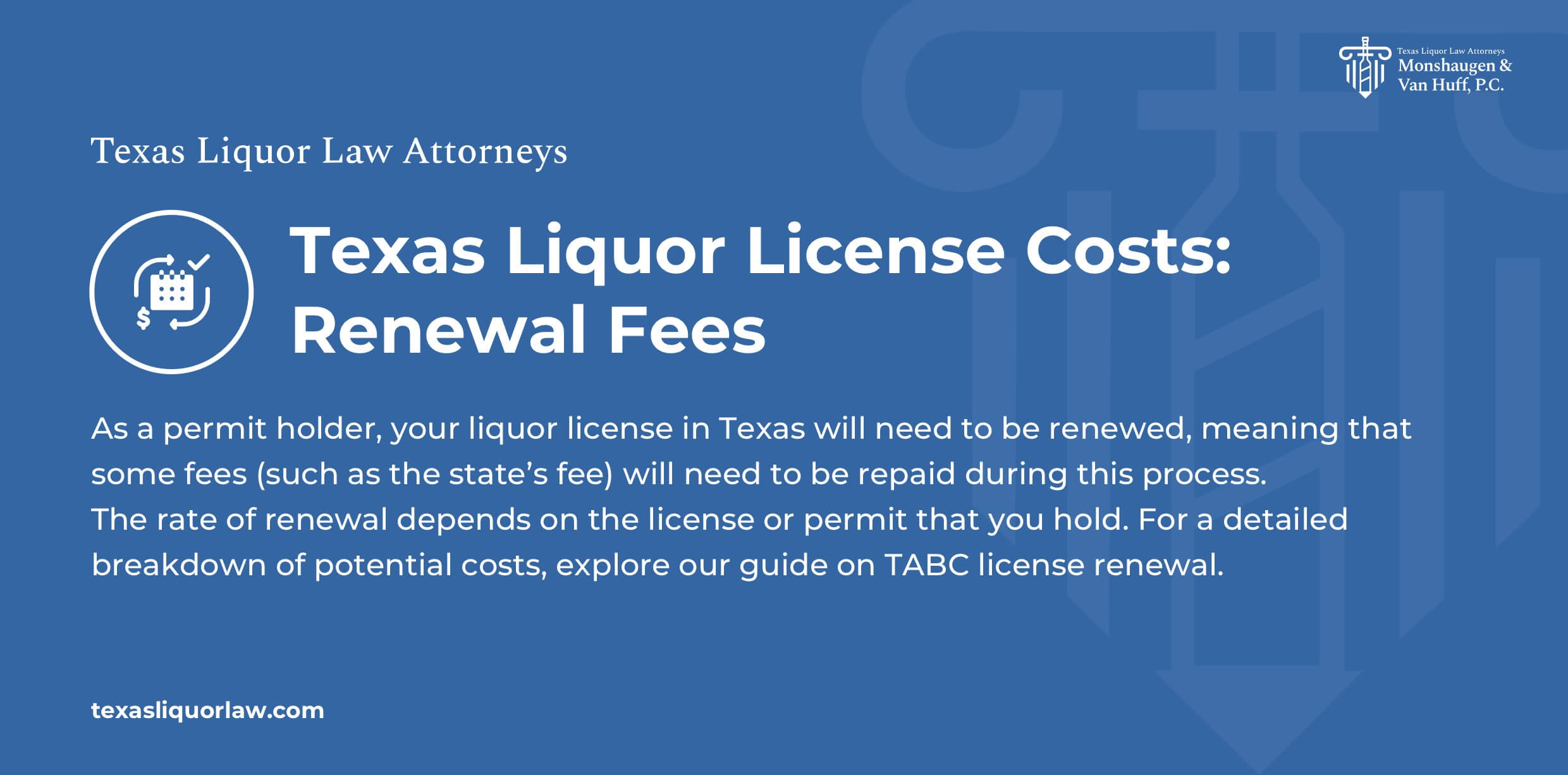If you operate a business in Texas that sells or serves alcohol, you will most likely need to have a liquor license in Texas from the Texas Alcoholic Beverage Commission (TABC). The type of Texas liquor license that you need depends on the type of business you run, as well as other factors including whether alcoholic beverages are consumed on or off premises. Understanding the cost of a Texas liquor license can be complex, but having someone who understands the local laws and regulations surrounding the alcoholic beverage industry will ensure the process goes smoothly. Monshaugen & Van Huff, P.C. helps Texas business owners to apply for TABC licenses, and can help answer questions about the process along the way. Below, we break down a few frequently asked questions about Texas liquor license costs.
How much does a liquor license cost in Texas?
Generally, a Texas liquor license cost will depend on the type of license that you need. If you are holding a temporary event, for example, it may be well under a $100, but if you are running a long-term business the cost may be in the thousands. Below are a few examples of the type of liquor license cost ranges that you can expect for certain business types.
- Manufacturing:
The range for manufacturing permits ranges from the low end of $500 for an Out-of-State Winery Direct Shipper’s Permit to the high end of a Brewer’s License or Winery Permit which are both $3,000. - Retail:
This can range from a Malt Beverage Retail Dealer’s Off-Premise license at $1,100. all the way to a Mixed Beverage Permit and at $5,300. - Distribution:
Distribution licenses tend to be on the higher end, no matter what. The range for distribution permits goes from a General Distributor’s License at $3,500 to a Wholesaler’s Permit at $4,000. - Other Licenses and Permits:
If your business doesn’t fall under the above categories, you may need another kind of license or permit. These include the lower end cost of the Third Party Local Cartage Permit at $600 to the higher end of the range with the Consumer Delivery Permit at $10,000. - Other Subordinate Authorities:
These permits usually apply to very specific cases and can range from a Water Park Permit at $300 to a Forwarding Center Authority at $2,000. - Daily Fee:
If you are having a one-time event for your non-profit organization, a daily fee may be appropriate. These event permits are $50 a day for up to ten consecutive days ($500).
With such a great range of prices, it’s extremely important to know what type of license you need prior to beginning the application process. For the complete list of fees you should visit the TABC website. Monshaugen & Van Huff, P.C. can help you figure out which is most applicable to your business.
What Texas liquor licenses do you need?
If you sell any form of alcohol in Texas, then you will need a TABC license. If you are a restaurant or bar, then it is likely you will need what is considered a primary license. In some particular cases, you may also need a more specific or temporary permit as well, such as an event that is held off-site of your primary business premises.
It’s important to note there is different criteria for Texas liquor licenses so far as where the alcohol can be served, sold, and consumed. It may also depend on if you mixed drinks, wine, or if you sell malt liquor, for example. These distinctions are essential to understand, so that you are completely following all TABC regulations, and are one reason that it is smart to have someone well-versed in the law to help you with your initial application.
If you are a manufacturer of alcoholic beverages, such as a brewery or distillery, then you would likely need a TABC manufacturing permit. Note that this may vary depending on if you have an attached bar or restaurant.
Depending on what type of license or permit that you need, the fee will differ. There are a few different aspects that go into each fee.
What Determines How Much a Liquor License In Texas Costs?
The cost of a liquor license in Texas can vary greatly depending on what type of license or permit that you need. For example a non-profit entity temporary event, for a one-time event, may be under $100. However, if you are a business that serves or sells alcohol and needs a primary permit, then it is more likely you will be spending closer to several thousand dollars. But what goes into that cost exactly?
State Fees
The bulk of the fee cost is what the state charges for the license type as a fee. These fees are the same across the state, and only vary based on what type of license or permit you are acquiring. This fee will be due when you submit your application, and is a cost you should prepare for ahead of time.
City and County Fees
In addition to the state fee, you will have to pay city and county fees. These vary depending on where in the state of Texas your business resides. These fees can be up to half of your TABC permit fee. This means, for example, that if your TABC fee is $2,000, the city and county could assess your fee at up to $1,000. Not all places assess fees at this high of a cost, though, but it is still important to keep in mind as a potential cost.
When this fee is assessed depends on what type of license you hold/are applying for. For mixed beverage permit holders, the city or county is required to wait three years before assessing your fee. This can result in a lowered cost of renewal overall. Wine and malt beverage permit holders, on the other hand, do not have a delay requirement for city and county permit fees.
Administrative Fees
As with many types of applications, a TABC liquor license application can include an administrative fee for processing your application. This fee is due when you submit the application and can vary in cost according to where you are located in the state.
Legal Notice Fees
If you are opening a new establishment, or will begin serving alcohol in it for the first time, then the state of Texas mandates that you must run a legal notice in a local newspaper in the city or town where your business will be based. This legal notice essentially states that you are applying for a liquor license to operate a business within the city or town limits. The cost of running this legal notice will greatly depend on the newspaper itself.
Note that this notice must run in a locally circulated paper–it cannot be the state paper or a city paper, if your business is located in a suburb for example. So it may take a little research to determine which paper is the correct one to run your notice in.
Renewal Fees
As a permit holder, your liquor license in Texas will need to be renewed, meaning that some fees (such as the state’s fee) will need to be repaid during this process. The rate of renewal depends on the license or permit that you hold. For a detailed breakdown of potential costs, explore our guide on TABC license renewal.
Where can you find liquor license fees?
The most current, and easiest place to find fees is at the TABC website. These may vary year-by-year, so it is essential to make sure you are looking at a current fee calendar. Below, though, we will break down a few examples of which licenses or permits most likely apply to which types of businesses. Remember that if you are unsure of the type of liquor license in Texas you will need, Monshaugen & Van Huff, P.C. can help you navigate your options.
Remember that the below are not all of the TABC Licenses and Permits available, but rather are examples of types of liquor licenses your business may need. For example, if you will need to transport alcohol you will need to ensure that the license or permit covers that aspect, or you may need an importer’s license if you are brining in alcohol from out of state. Remember to follow all applicable liquor laws no matter what license you hold.
Restaurants and Bars
- Mixed Beverage Permit
- Wine and Malt Beverage Retailer’s Permit
- Wine and Malt Beverage Retailer’s Off-Premise Permit
Private clubs and Organizations
- Private Club Registration Permit
- Private Club Malt Beverage and Wine Permit
Brewers and Manufacturers
- Brewer’s License or Brewer’s Permit
- Winery Permit
- Distiller’s and Rectifier’s Permit
Suppliers and Distributors
- General Distributor’s License
- Branch Distributor’s License
- Wholesaler’s Permit
- General Class B Wholesaler’s Permit
In addition to knowing what TABC license you need to apply for, you will also have to meet eligibility and Texas liquor license requirements to apply. These requirements include:
- Have not had a felony conviction within the last five years
- 21 years of age or older
- No vested interest in a TABC permit inside a different tier system
- No moral torpitude violations within the six months previous to applying
Why is it important to have the right license?
Applying for the correct type of liquor license in Texas will ensure that you meet the Texas Alcoholic Beverage Commission regulations for your business and you will have less liability overall. It also will make it more likely for your application to be approved if you apply for the correct alcohol license at the start.
Remember that in some cases you may need a primary license, as well as secondary ones. Monshaugen & Van Huff, P.C. can help you determine when this may be the case.
How do you apply for a Texas liquor license?
Once you have determined what type of license or alcohol permit you need, and the cost associated with it, you will be ready to begin the liquor license application process to actually get a liquor license.
If you meet the eligibility requirements we listed previously, then you will then move on to the actual application process itself. The steps to apply include:
- Obtain the requisite certifications from the city, county, comptroller, and the TABC bonds
- Create an account on AIMS (Alcohol Industry Management System)
- Apply for your license, keep your application tracking number somewhere safe and easy to access
- Complete the TABC licensing course
- Submit your completed application
- Pay the application fee
The review process to get a liquor license may take anywhere from a few weeks to several months. Your tracking number can be used to check the status of your application at any time.
How Monshaugen & Van Huff, P.C. can help
Monshaugen & Van Huff, P.C. are Texas liquor law attorneys and bring years of specialized experience to help you with the often complex application and licensing process of the TABC. Their goal is to ensure that small businesses who sell alcoholic beverages in Texas have the best opportunities from their start and fully comply with all local laws. We can hep you determine the best license type for your business, navigate the TABC liquor license application, determine the liquor license costs you will need to pay for the license, and ensure that your business meets state and local regulations. Monshaugen & Van Huff, P.C. work with everyone from those beginning their business journey to those who are preparing to sell their business. While we are headquartered in Houston, we are proud to serve any one throughout the great state of Texas.
